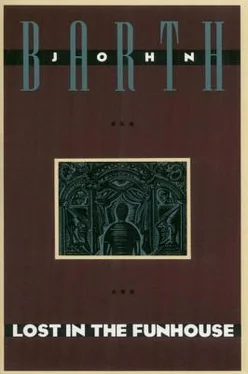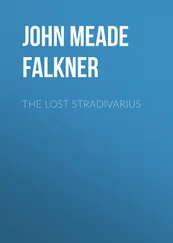John Barth - Lost in the Funhouse
Здесь есть возможность читать онлайн «John Barth - Lost in the Funhouse» весь текст электронной книги совершенно бесплатно (целиком полную версию без сокращений). В некоторых случаях можно слушать аудио, скачать через торрент в формате fb2 и присутствует краткое содержание. Год выпуска: 2014, ISBN: 2014, Издательство: Knopf Doubleday Publishing Group, Жанр: Современная проза, на английском языке. Описание произведения, (предисловие) а так же отзывы посетителей доступны на портале библиотеки ЛибКат.
- Название:Lost in the Funhouse
- Автор:
- Издательство:Knopf Doubleday Publishing Group
- Жанр:
- Год:2014
- ISBN:978-0-8041-5250-1
- Рейтинг книги:3 / 5. Голосов: 1
-
Избранное:Добавить в избранное
- Отзывы:
-
Ваша оценка:
- 60
- 1
- 2
- 3
- 4
- 5
Lost in the Funhouse: краткое содержание, описание и аннотация
Предлагаем к чтению аннотацию, описание, краткое содержание или предисловие (зависит от того, что написал сам автор книги «Lost in the Funhouse»). Если вы не нашли необходимую информацию о книге — напишите в комментариях, мы постараемся отыскать её.
Lost in the Funhouse — читать онлайн бесплатно полную книгу (весь текст) целиком
Ниже представлен текст книги, разбитый по страницам. Система сохранения места последней прочитанной страницы, позволяет с удобством читать онлайн бесплатно книгу «Lost in the Funhouse», без необходимости каждый раз заново искать на чём Вы остановились. Поставьте закладку, и сможете в любой момент перейти на страницу, на которой закончили чтение.
Интервал:
Закладка:
“Oh boy,” Konrad sighed.
“Nah, it is a bee! A regular bee! I declare.”
My uncle returned to his breakfast, opining that no purple bee ought to be considered regular who moreover flew upside down without benefit of head.
“You laugh; there’s more to this than meets the eye,” his wife said. “All the time he was our Honig , that’s what drew the bees. Now his mark.”
Grandfather entered at this juncture, and while unable to share Aunt Rosa’s interpretation of my birthmark, he was willing to elaborate on her conceit.
“ Ja , sure, he was the Honig , and Andy’s the queen, hah? And Hector’s a drone that’s been kicked out of the hive.”
Aunt Rosa lightly fingered my port-wine mark. “What did Willy Erdmann mean about the Honig was a drone-bee?”
“Never mind Willy,” Konrad said. “Anyhow we poor worker-ones have to get to it.”
But all that forenoon as he plied his wrench and dinged his forks he smiled at his wife’s explanation of the swarm; after lunch it turned in his fancy as he pedaled through West End on behalf of The Book of Knowledge. By suppertime, whether drawing on his own great fund of lore or the greater of his stock-in-trade, he had found a number of historical parallels to my experience in the hammock.
“It’s as clear a naming-sign as you could ask for,” he declared to Andrea.
“I don’t even want to think about it,” Mother said. She was still in some pain, not from the venom but from superfluous lactation, which her diet had not yet checked.
“No, really,” he said. “For instance, a swarm of bees lit on Plato’s mouth when he was a kid. They say that’s where he got his way with words.”
“Is that a fact now,” Aunt Rosa marveled, who had enlarged all day to Mother on the coincidence of my nickname, my birthmark, and my immersion in the bees. “I never did read him yet.”
“No kid of mine is going to be called Plato,” Andrea grumbled. “That’s worse than Christine.”
Uncle Konrad was not discouraged. “Plato isn’t the end of it. They said the exact same thing about Sophocles, that wrote all the tragedies.”
Mother allowed this to be more to the point. “Tragedies is all it’s been, one after the other.” But Sophocles pleased her no more than Plato as a given name. Xenophon, too, was rejected, whose Anabasis , though my uncle had not read it himself, was held to have been sweetened by the same phenomenon.
“If his name had been Bill or Percy,” said my mother. “But Xenophon for Christ sake.”
Grandfather had picked his teeth throughout this discussion. “A Greek named Percy,” he now growled.
Aunt Rosa, whose grip on the thread of conversation was ever less strong than her desire to be helpful, volunteered that the Greek street-peddler from whom Konrad had purchased her a beautiful Easter egg at the Oberammergau Passion play in 1910 had been named Leonard Something-or-other.
“It was on his pushcart, that stood all the time by our hotel,” she explained, and not to appear overauthoritative, added: “But Konrad said he was a Jew.”
“Look here,” said Uncle Konrad. “Call him Ambrose.”
“Ambrose?”
“Sure Ambrose.” Quite serious now, he brushed back with his hand his straight blond hair and regarded Mother gravely. “Saint Ambrose had the same thing happen when he was a baby. All these bees swarmed on his mouth while he was asleep in his father’s yard, and everybody said he’d grow up to be a great speaker.”
“Ambrose,” Rosa considered. “That ain’t bad, Andy.”
My mother admitted that the name had a not unpleasant sound, at least by contrast with Xenophon.
“But the bees was more on this baby’s eyes and ears than on his mouth,” Grandfather observed for the sake of accuracy. “They was all over the side of his face there where the mark is.”
“One of them sure wasn’t,” Mother said.
“So he’ll grow up to see things clear,” said Uncle Konrad.
Andrea sniffed and lit a cigarette. “Long as he grows up to be a saint like his Uncle Konrad, huh Rosa. Saints we can use in this family.”
The conversation turned to other matters, but thenceforward I was called Saint Ambrose, in jest, as often as Honig , and Ambrose by degrees became my name. Yet years were to pass before anyone troubled to have me christened or to correct my birth certificate, whereon my surname was preceded by a blank. And seldom was I ever to be called anything but Honig , Honeybee (after my ambiguous birthmark), or other nicknames.
As toward one’s face, one’s body, one’s self, one feels complexly toward the name he’s called by, which too one had no hand in choosing. It was to be my fate to wonder at that moniker, relish and revile it, ignore it, stare it out of countenance into hieroglyph and gibber, and come finally if not to embrace at least to accept it with the cold neutrality of self-recognition, whose expression is a thin-lipped smile. Vanity frets about his name, Pride vaunts it, Knowledge retches at its sound, Understanding sighs; all live outside it, knowing well that I and my sign are neither one nor quite two.
Yet only give it voice: whisper “Ambrose,” as at rare times certain people have — see what-all leaves off to answer! Ambrose, Ambrose, Ambrose, Ambrose! Regard that beast, ungraspable, most queer, pricked up in my soul’s crannies!
AUTOBIOGRAPHY: A Self-Recorded Fiction
You who listen give me life in a manner of speaking.
I won’t hold you responsible.
My first words weren’t my first words. I wish I’d begun differently.
Among other things I haven’t a proper name. The one I bear’s misleading, if not false. I didn’t choose it either.
I don’t recall asking to be conceived! Neither did my parents come to think of it. Even so. Score to be settled. Children are vengeance.
I seem to’ve known myself from the beginning without knowing I knew; no news is good news; perhaps I’m mistaken.
Now that I reflect I’m not enjoying this life: my link with the world.
My situation appears to me as follows: I speak in a curious, detached manner, and don’t necessarily hear myself. I’m grateful for small mercies. Whether anyone follows me I can’t tell.
Are you there? If so I’m blind and deaf to you, or you are me, or both’re both. One may be imaginary; I’ve had stranger ideas. I hope I’m a fiction without real hope. Where there’s a voice there’s a speaker.
I see I see myself as a halt narrative: first person, tiresome. Pronoun sans ante or precedent, warrant or respite. Surrogate for the substantive; contentless form, interestless principle; blind eye blinking at nothing. Who am I. A little crise d’identité for you.
I must compose myself.
Look, I’m writing. No, listen, I’m nothing but talk; I won’t last long. The odds against my conception were splendid; against my birth excellent; against my continuance favorable. Are yet. On the other hand, if my sort are permitted a certain age and growth, God help us, our life expectancy’s been known to increase at an obscene rate instead of petering out. Let me squeak on long enough, I just might live forever: a word to the wise.
My beginning was comparatively interesting, believe it or not. Exposition. I was spawned not long since in an American state and born in no better. Grew in no worse. Persist in a representative. Prohibition, Depression, Radicalism, Decadence, and what have you. An eye sir for an eye. It’s alleged, now, that Mother was a mere passing fancy who didn’t pass quickly enough; there’s evidence also that she was a mere novel device, just in style, soon to become a commonplace, to which Dad resorted one day when he found himself by himself with pointless pen. In either case she was mere, Mom; at any event Dad dallied. He has me to explain. Bear in mind, I suppose he told her. A child is not its parents, but sum of their conjoinèd shames. A figure of speech. Their manner of speaking. No wonder I’m heterodoxical.
Читать дальшеИнтервал:
Закладка:
Похожие книги на «Lost in the Funhouse»
Представляем Вашему вниманию похожие книги на «Lost in the Funhouse» списком для выбора. Мы отобрали схожую по названию и смыслу литературу в надежде предоставить читателям больше вариантов отыскать новые, интересные, ещё непрочитанные произведения.
Обсуждение, отзывы о книге «Lost in the Funhouse» и просто собственные мнения читателей. Оставьте ваши комментарии, напишите, что Вы думаете о произведении, его смысле или главных героях. Укажите что конкретно понравилось, а что нет, и почему Вы так считаете.












